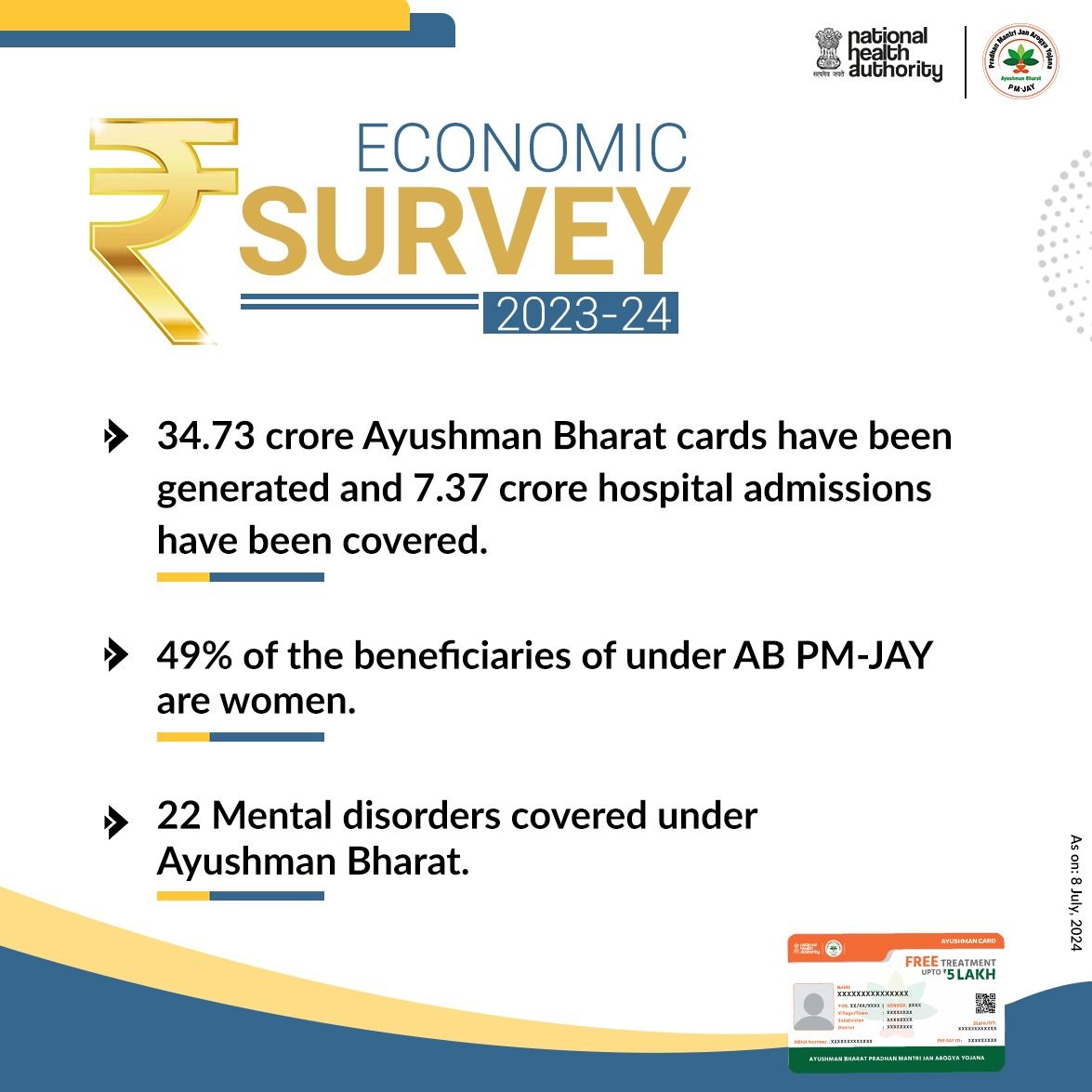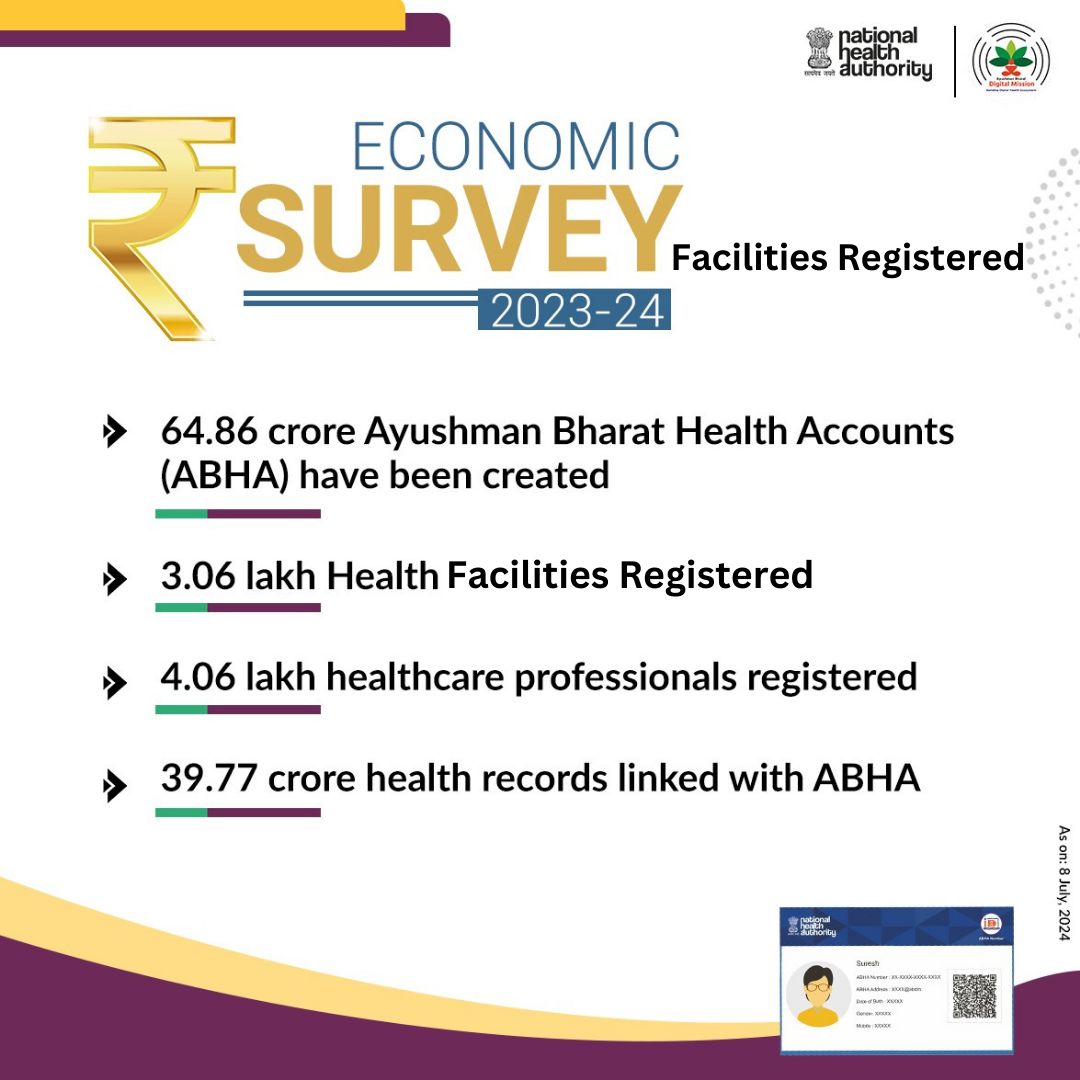Economic Survey Revealed Ayushman Bharat Reduced Healthcare Costs & Debt

The Economic Survey highlights that Ayushman Bharat shields families from market vulnerabilities and protects the healthcare system from micro-economic shocks.
The Economic Survey 2023-24, tabled by Union Minister of Finance and Corporate Affairs Nirmala Sitharaman in Parliament on July 22, highlighted the substantial impact of the Ayushman Bharat health insurance scheme in alleviating healthcare costs and preventing debt due to catastrophic medical expenses.
The survey underscored the scheme's role in promoting economic stability and enhancing healthcare accessibility.
Significant Reduction in Treatment Costs
Citing Health Ministry estimates, the survey reported that treatment costs under the Ayushman Bharat Pradhan Mantri Jan Arogya Yojana (AB PM-JAY) would have been 1.5 to 2 times higher if beneficiaries had sought the same treatments independently.
By incorporating this multiplier effect, the scheme has saved more than INR 1.25 Lakh Cr in out-of-pocket expenditures (OOPE) for poor and deprived families as of January 12, 2024.
The Economic Survey emphasized that Ayushman Bharat shields families from market vulnerabilities and protects the healthcare delivery system from micro-economic shocks.
Catastrophic health expenses can lead to the impoverishment of individuals and families, forcing them to forego treatment or resort to debt. By mitigating healthcare costs, the scheme improves financial stability and enhances the loan repayment capacity of households.
Improved Credit Market Outcomes
The implementation of PMJAY has significantly improved credit market outcomes in India. The survey highlighted the interplay between health insurance and financial stability, noting that public health initiatives can create substantial economic benefits beyond healthcare.
A recent study found that the non-performing asset (NPA) rate in microfinance loans decreased by 3.7 to 4.0% points in PMJAY-implemented districts compared to non-implemented regions, representing a 34.1% to 34.6% reduction relative to average NPA rates.
Since its inception, Ayushman Bharat has generated over 34.7 Cr cards and covered 7.37 Cr hospital admissions, with 49% female beneficiaries.

Source: NHA (LinkedIn)
In the medium term, health premiums are projected to grow by 9.7% annually from 2024 to 2028, supported by regulatory initiatives aimed at improving the attractiveness of insurance offerings.
The survey underscored the importance of primary healthcare as a foundational element of the overall health ecosystem. The latest National Health Accounts (NHA) estimates show an increase in the share of Government Health Expenditure (GHE) in the total GDP and the Total Health Expenditure (THE).
The share of primary healthcare expenditures rose from 51.3% of GHE in FY15 to 55.9% in FY20, while private health expenditures on primary and secondary care declined from 83.0% to 73.7% during the same period.
Government Initiatives & Achievements
The Ayushman Bharat scheme has made quality medicines available at 50-90% cheaper than market rates through PM Jan Aushadhi Kendras.
Since September 2023, the Ayushman Bhav Campaign has facilitated 16.96 Lakh wellness, yoga, and meditation sessions, 1.89 Cr teleconsultations, free drugs for 11.64 Cr people, and free diagnostic services for 9.28 Cr people.
Additionally, 2.0 Cr patients have consulted general outpatient departments (OPD), 90.69 Lakh patients have consulted specialist OPD, 65,094 major surgeries, 1,96,156 minor surgeries have been conducted, and 1.20 Lakh Ayushman Sabhas have been organized. The cumulative footfall reached 20.66 Cr in 25.25 Lakh health melas as of March 31, 2024.

Source: NHA (LinkedIn)
Stay tuned for more such updates on Digital Health News





























